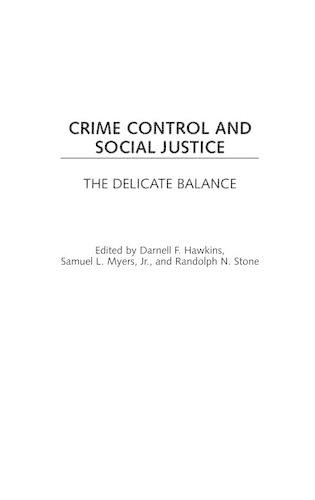
Crime Control and Social Justice: The Delicate Balance
(Hardback)
Publishing Details
Crime Control and Social Justice: The Delicate Balance
By (Author) Darnell F. Hawkins
By (author) Samuel Myers
By (author) Randolph N. Stone
Bloomsbury Publishing PLC
Praeger Publishers Inc
30th June 2003
United States
Classifications
General
Non Fiction
364.40973
Physical Properties
Hardback
504
Description
This collection examines the perennial tension between society's need to protect its citizens from crime, while assuring that the crime control and reduction measures that it enacts do not deny basic rights or exacerbate the socioeconomic inequality that gives rise to disparate rates of offending. Such tension exists in all modern societies, but it has been particularly evident in the United States, a nation whose history manifests both group inequality and an ongoing effort to reduce such inequality, assure fairness, equal protection, and due process for individuals. Focusing largely on developments in criminal justice policies and practices enacted during the last few decades, the essays in this volume explore the delicate balance between governmental crime control efforts and professed goals of promoting social justice and protecting civil liberties. Representing disciplines ranging from criminology to economics, geography, law, sociology, and political science, the contributors critically examine and debate the nature and impact of recent and contemporary American criminal justice policies. Particular attention is paid to the impact of such policies on the nation's racial divide, but the authors use this disparity to illustrate the broader public policy paradoxes and dilemmas which lie at the heart of the struggle to control rising crime rates. Purported reforms in sentencing, the nation's growing prison population, the war on drugs and gangs, the demise of juvenile court, racial profiling and affirmative action are all grist for the mill. Contributors also ask more philosophical and epistemological questions such as the meaning of social justice, fairness, and justice and their relevance for understanding contemporary criminal justice.
Reviews
[T]his collection is unique in blending the research on the criminal justice system with parallel policies regarding criminal and social justice....[a] valuable resource and learning tool. Professionals and students in a wide variety of fields including economics, sociology, political science, law, criminal justice and social work among others would benefit from reading this book. It is an impressive and timely exposition of important social issues that should be openly debated and researched. The book is an enlightening and engaging anthology of studies that will surely lead to lively and intense discussions.-Journal of Sociology and Social Welfare
[T]his volume makes a lucid contribution in the continued dilemma of disproportionate minority confinement in the U.S. criminal justice system.-Criminal Justice Review
"This collection is unique in blending the research on the criminal justice system with parallel policies regarding criminal and social justice....a valuable resource and learning tool. Professionals and students in a wide variety of fields including economics, sociology, political science, law, criminal justice and social work among others would benefit from reading this book. It is an impressive and timely exposition of important social issues that should be openly debated and researched. The book is an enlightening and engaging anthology of studies that will surely lead to lively and intense discussions."-Journal of Sociology and Social Welfare
"This volume makes a lucid contribution in the continued dilemma of disproportionate minority confinement in the U.S. criminal justice system."-Criminal Justice Review
"[T]his volume makes a lucid contribution in the continued dilemma of disproportionate minority confinement in the U.S. criminal justice system."-Criminal Justice Review
"[T]his collection is unique in blending the research on the criminal justice system with parallel policies regarding criminal and social justice....[a] valuable resource and learning tool. Professionals and students in a wide variety of fields including economics, sociology, political science, law, criminal justice and social work among others would benefit from reading this book. It is an impressive and timely exposition of important social issues that should be openly debated and researched. The book is an enlightening and engaging anthology of studies that will surely lead to lively and intense discussions."-Journal of Sociology and Social Welfare
Author Bio
DARNELL F. HAWKINS is Professor of African-American Studies, Sociology and Criminal Justice at the University of Illinois at Chicago. SAMUEL L. MYERS, JR., is Roy Wilkins Professor of Human Relations and Social Justice at the Hubert H. Humphrey Institute of Public Affairs at the University of Minnesota./e He was formerly Professor of Economics and Director of the African American Studies Program at the University of Maryland at College Park, and has held appointments at the University of Texas, Austin, and the University of Pittsburgh, and the Federal Trade Commission. RANDOLPH N. STONE is Clinical Professor of Law at the University of Chicago's Edwin F. Mandel Legal Aid Clinic/e There he helped create the Criminal and Juvenile Justice Project, a program that provides law and social work students with the supervised opportunity to defend children accused of criminal and delinquent behavior. He was the first African-American to hold the position of Public Defender of Cook County, Illinois.
